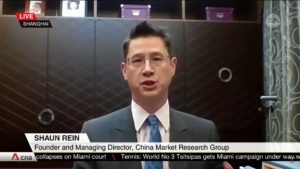
Former Alibaba executive Sharon Gai looks at Drugstorenews back on how the company conquered retail in China, focusing on pharmacy with Alibaba Health. “What this medical doctor app did was digitize that entire process,” she said.
Drugstorenews:
Gai took the discussion to Alibaba Health, noting that China only has about 1.8 doctors per every 1,000 people compared to 2.4 in the United States and 2.8 in the U.K. “This means that resources in health care are very strained in China. When there’s a lot of competition, it breeds innovation. That‘s exactly what Alibaba Health has in terms of its growth trajectory,” she said.
AliHealth started as a cloud pharmacy, but its product managers recognized that people were searching for grocery and skin care items, OTCs or certain drugs. “Ali pharmacy was pulled out of Tmall and a separate app was created,” she explained
“The product managers noted that there were people searching to buy contact lenses and prescription eyeglasses, they needed eye exams and physical exams, they were looking for sexual health products, or wanted to do STD tests or pregnancy tests. This became a snowball effect and the number of services this app started to cater to. Today Alibaba Health is a full fledged telehealth app.”
Gai also discussed how a medical doctor app was created for traditional Chinese medicine, a huge Chinese sector that she described as “a very old school brick and mortar place to play.” “What this medical doctor app did was digitize that entire process,” she said. “You open the app, consult with the Chinese medicinal doctor and he will tell you what you need and an entire packet of ingredients will be shipped right to your doorstep.”
Addressing the last pillar of Alibaba Health, a business to business pillar in which the creators built out a health knowledge map and traceability code, Gai said, “AliHealth set a standard in
creating a QR code that every single brand would need to stick on their packaging so when this product is shipped to the end customer, they can scan it and see exactly where this medicine came from. This is the interface of the telehealth app, where you also can see the balance on your health insurance card, nearby hospitals, a doctor for an online experience, get medicine delivered in around 30 minutes to an hour, order vaccinations, get eye exams, mental health services and medical beauty.”The app also features short-form videos that offer health advice from doctors, who are becoming influencers. “As a user, you’re constantly learning about health care in general. What AliHealth really did, the big innovation, is consumerization of healthcare services,” Gai said.
Lastly, Gai said that AliHealth is good at “new retail,” a term developed by Jack Ma in 2016. “It’s basically the unification or the synchronization of online and offline services,” she said.
Sharon Gai is a speaker at the China Speakers Bureau. Do you need her at your meeting or conference? Do get in touch or fill in our speakers’ request form.
Are you looking for more innovation experts at the China Speakers Bureau? Do check out this list.












